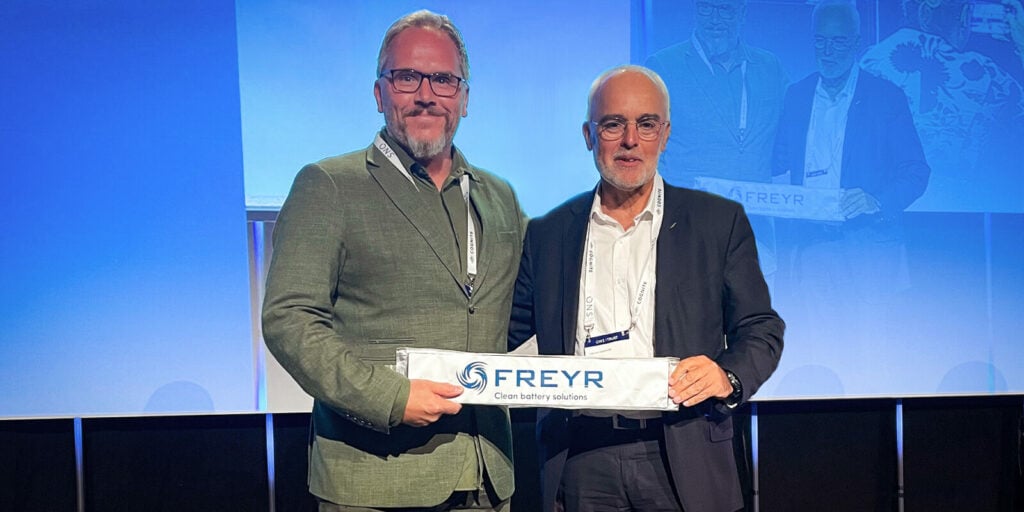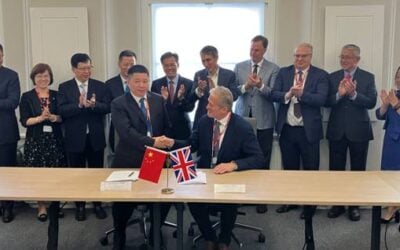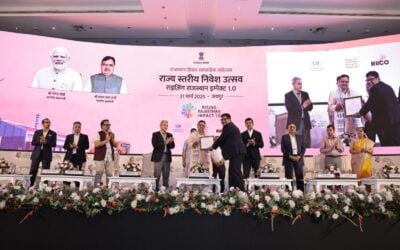
FREYR Battery and Nidec intend to form a joint venture (JV) for the manufacture of battery storage modules and packs, using semi-solid lithium-ion technology.
The pair have also increased the size of a battery cell supply deal from an initial 31GWh by 2030, to 38GWh by that time, with the possibility of increasing that further to 50GWh.
Enjoy 12 months of exclusive analysis
- Regular insight and analysis of the industry’s biggest developments
- In-depth interviews with the industry’s leading figures
- Annual digital subscription to the PV Tech Power journal
- Discounts on Solar Media’s portfolio of events, in-person and virtual
Norwegian battery manufacturing startup FREYR is building out battery cell gigafactories in its home country using the semi-solid electrode technology developed by US company 24M, promising higher energy density, safer batteries at lower cost than of competitors using incumbent technology platforms.
The manufacturer is also expanding into the US, having recently established a tech centre in Boston, appointed a North American head of operations and is already listed on the New York Stock Exchange (NYSE). It has just opened a tech campus and business unit in Japan together with 24M, too.
FREYR recently said it is ready to go ahead with construction of its Norwegian factory complex, Giga Arctic, which combines previous plans for two smaller factories into one, targeting 29GWh of annual production capacity while aiming for the business to have 200GWh of annual production lines in place by 2030 across different locations.
The US$1.6 billion Giga Arctic factory is expected to go into operation in early 2024.
Meanwhile, Nidec has been revealed as one of the manufacturer’s first energy storage system (ESS) sector off-takers. The 31GWh deal was announced in December last year by FREYR, but for reasons of confidentiality, Nidec’s name was not disclosed at the time in connection with the deal.
FREYR said that based on current pricing trends and raw materials cost pass-through for batteries, the Nidec deal could be worth in excess of US$3 billion.
Japan-headquartered Nidec said today that FREYR’s semi-solid lithium-ion batteries, made using 100% clean energy from hydroelectric power supplied by Statkraft, will go into Nidec’s battery energy storage system (BESS) solutions.
Nidec has to date delivered 1.3GW of BESS into 121 different projects in 21 countries including work as an integrator and EPC contractor. Aiming for carbon neutrality by 2040, the company identified FREYR’s low carbon production processes as an important strategic addition to its supply base, although it will continue to speak with other battery makers, Nidec said.
FREYR said that the deal with Nidec will be an important piece of the project financing picture for the Norway gigafactory. The battery maker has already announced other deals with BESS industry players Powin Energy (28.5GWh) and Honeywell (19GWh).
The pair’s JV will be two-thirds owned by Nidec and a third owned by FREYR Battery. A name hasn’t been decided on yet, and its launch is anticipated to happen between October and December this year.
Together, Nidec and FREYR plan to develop, manufacture and sell battery systems using FREYR cells and integrated by Nidec, serving industrial and utility-scale applications and beginning production in the first half of 2024 as Giga Arctic ramps up into mass production.
“Today’s landmark sales agreement inclusive of optional volumes represents roughly 50% of our targeted production from Giga Arctic by 2030,” FREYR CEO Tom Einar Jensen said.
“Combined with Nidec’s trust in FREYR as a joint venture partner for ESS solutions this represents a fundamentally important milestone to support the conclusion of our ongoing project financing efforts at competitive terms.”
Norway’s Morrow Battery also set to construct factory
That 200GWh production target by 2030 represents a doubling of the original goal FREYR was aiming for, with the company identified as a potential cornerstone of a green energy tech economy for Norway by the country’s government.
Last week, Morrow Battery, another battery-making startup in the country, said it has signed a JV agreement of its own, this one covering the construction and financing of a NOK480 million (US$49 million) gigafactory in Arendal, a city on Norway’s southeastern coast.
Morrow has signed up with the Industrial Development Corporation of Norway (SIVA), a government agency, which is tasked with financing and building infrastructure projects. Aligned with Norway’s national battery strategy, construction is expected to begin during September.






